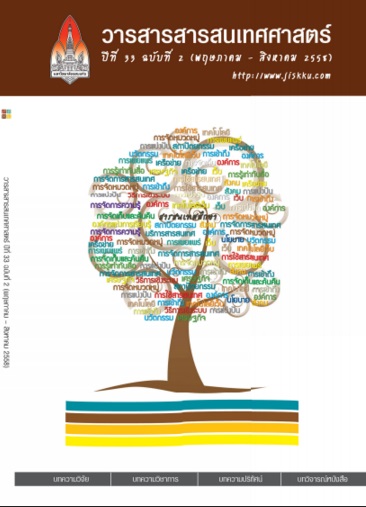การประเมนผลการดำเนินของศูนย์เรียนรู้ชุมชนในประเทศไทย (The Evaluation of Community Learning Centers in Thailand)
Keywords:
ศูนยเรียนรูชุมชน, การประเมินผลการดําเนินงาน, Community Learning Centers, Evaluation of Community Learning CentersAbstract
บทคัดยอ
บทความนี้มีวัตถุประสงค์เพื่อนำเสนอสภาพการดำเนินงานของศูนย์เรียนรู้ชุมชนในประเทศไทย ซึ่งเปนสวนหนึ่งของการวิจัยพัฒนาตัวแบบศูนยเรียนรูชุมชนสําหรับ ประเทศไทย ดำเนินการวิจัยโดยใช้วิธีวิจัยเชิงสำรวจ เก็บรวบรวมข้อมูลโดยการสุ่มตัวอย่าง แบบแบงชั้นภูมิจากผูดูแลหรือรับผิดชอบศูนยเรียนรูชุมชนทั้งที่อยูภายใตการสนับสนุน
ของกรมการพัฒนาชุมชน และที่อยู่ภายใต้สังกัดสำนักงานส่งเสริมการศึกษานอกระบบ และการศึกษาตามอัธยาศัย วิเคราะหขอมูลโดยใชคาเฉลี่ยเลขคณิต รอยละ และประเมินผลสัมฤทธิ์โดยใชแนวคิดการประเมินโครงการ CIPP Model ของ Daniel L. Stufflebeam ผลจากการวิจัยจําแนกเปน 4 ดาน ดังนี้ 1) ดานบริบทศูนยเรียนรูชุมชนบริหารงานในรูปคณะกรรมการ มีวาระการดำรงตำแหน่ง 4 ปี คณะกรรมการมาจากผู้นำชุมชน จัดตั้งศูนย์ในพื้นที่สาธารณะประโยชน ี่ ในชุมชนมีอาคารเป็นเอกเทศ โดยมีพื้นที่ดำเนินการมากกว่า 100 ตารางวา มีการจัดแบงพื้นที่เพื่อการเรียนการสอน 2) ดานปจจัยนําเขา ศูนยเรียนรูชุมชนไดรับงบประมาณจากสํานักงานสงเสริมการศึกษานอกระบบและการศึกษาตามอัธยาศัยเปนหลัก มีสิ่งอํานวยความสะดวกตางๆ ไดแก เกาอี้ เครื่องเลนดีวีดี เครื่องคอมพิวเตอร หนังสือหรือตำราเรียน และมีบุคลากรเป็นครูประจำศูนย์เรียนรู้ชุมชน 3) ด้านกระบวนการดําเนินงาน กอนเริ่มดําเนินโครงการมีการวางแผนงาน กลุมเปาหมายหลักของศูนยคือ คนวัยทำงาน มีการจัดกิจกรรมการเรียนรู้โดยการฝึกปฏิบัติจริง มีการประเมินผลและสรุปผลการดำเนินงานเมื่อสิ้นสุดโครงการ 4) ด้านผลการดำเนินงาน มีการจัดกิจกรรมด้านการพัฒนาชุมชน และการบริการสารสนเทศและความรูในระดับมากจากการประเมินผลการดำเนินงานในภาพรวมพบว่า ศูนย์การเรียนรู้ชุมชนส่วนใหญ่ มีผลการดําเนินงานจัดอยูในกลุมที่กําลังพัฒนา
Abstract
The purpose of this article is to present the performance of the
Community Learning Centres (CLC) in Thailand, as part of a programme of research
on the development of the Community Learning Centre model for Thailand. The
research was conducted by means of a survey. Data were collected by using
stratified sampling of managers of community learning centres in Thailand. The
data were then analyzed by mean, percentage and the CIPP Model for evaluation
by Daniel L. Stufflebeam. The key findings were divided into four sections as
follows: 1) the context section showed that the CLC(s) was (were) administered by
nine committee members who were selected from the community leaders to serve
a four-year term. The CLC, which was located within a public community area, was
a single building with over 100 square meters of working space and was allocated
for educational purposes. 2) In terms of the input section, the CLC was financially
supported and budgeted by the NFE. There were numerous facilities such as chairs,
DVD players, computers, books, and instructors. 3) For the working process
section, the CLC had a systematic plan before the start of a project, setting the
working age as a target group, planning practical activities encouraging learning
by doing concepts, and evaluating and summarizing the operation results. 4) The
operation section revealed that there were intensive activities for community
development, information technology and education services.
The finding, according to the CLC evaluation, found that the majority of
CLC had the operation results in the developing level.








